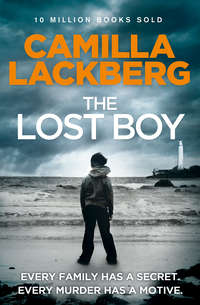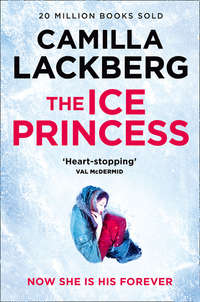
Полная версия
The Hidden Child
‘What do you mean?’ he asked, trying to look innocent.
‘Don’t you go blinking those baby blue eyes at me. What aren’t you telling me?’ She took a sip of the hot tea and waited with amusement for him to stop squirming and get to the point.
‘Well …’
‘Yes?’ said Erica helpfully, acknowledging that part of her was taking a sadistic delight in his obvious discomfort.
‘Well, something happened while Maja and I were out on our walk.’
‘Really? You’re both back home in one piece, so what could it be?’
‘Er …’ Patrik sipped his tea to buy some time as he pondered how best to explain. ‘We were walking over towards Lersten’s mill, and then Martin and the team turned up to check out a call they’d received.’ He gave Erica a cautious look. She raised one eyebrow and waited for him to go on.
‘Someone had phoned in a report of a dead body in a house on the road to Hamburgsund, so they were heading over there to take a look.’
‘I see. But you’re on paternity leave, so that really has nothing to do with you.’ Suddenly she gave a start, her cup halfway to her lips. ‘You don’t mean that you …’ She stared at him in disbelief.
‘Yes,’ said Patrik, his voice sounding a bit shrill and his eyes fixed on the table.
‘Don’t tell me you took Maja to a place where a dead body was found?’ Her gaze was riveted on him.
‘Um, yes, but Martin watched her while I went inside to have a look. He took her over to see the flower bed.’ He ventured a slightly conciliatory smile but received only an icy glare in return.
‘Inside to have a look?’ The ice cubes in her voice were clinking mercilessly. ‘You’re on paternity leave. The key words here are “on leave”, not to mention “paternity”! How hard can it be to say “I’m not working right now”?’
‘I just went inside to take a look,’ said Patrik lamely, but he knew Erica was right. He was on leave. Paternity leave. His colleagues could run the show. And he shouldn’t have taken Maja anywhere near a crime scene.
At that instant he realized that there was one more detail Erica didn’t know about. He felt a nervous twitch on his face as he swallowed hard and added:
‘It turned out to be murder, by the way.’
‘Murder!’ Erica’s voice rose to falsetto. ‘It’s not enough that you take Maja to a house where a body was discovered – it turns out to be homicide.’ She shook her head. The rest of the words she wanted to say seemed to have stuck in her throat.
‘I won’t do it ever again.’ Patrik threw out his hands. ‘The team will just have to solve the case on their own. I’m on leave until January, and they know that. I’m going to devote myself one hundred per cent to Maja. Word of honour!’
‘You better mean that,’ snarled Erica. She was so angry that she wanted to lean across the table and shake him. Then curiosity overcame her:
‘Where did it happen? Have they found out who the victim was?’
‘I’ve no idea. It was a big white house a few hundred metres down the road on the left-hand side, on the first turnoff to the right after the mill.’
Erica gave him a strange look. Then she said, ‘A big white house with grey trim?’
Patrik thought for a moment and then nodded. ‘Yes, I think that’s right. It said “Frankel” on the letter box.’
‘I know who lives there. Axel and Erik Frankel. You know, the Erik Frankel that I went to see about the Nazi medal.’
Patrik looked at her, dumbstruck. How could he have forgotten that? Frankel wasn’t exactly the most common name in Sweden.
From the living room they could hear Maja babbling happily.
It was late afternoon by the time they finally made it back to the station. Torbjörn Ruud, head of the crime tech division, and his team had arrived, made a thorough job of it, and then left. The body had also been removed and was on its way to the forensics lab where it would undergo every imaginable and unimaginable examination.
‘Well, that was a hell of a Monday,’ said Mellberg with a sigh as Gösta parked the car.
‘Sure was,’ said Gösta, never one to waste words.
As they entered the station, Mellberg barely had time to register something approaching at high speed before a shaggy form jumped on him and he felt a wet tongue licking his face.
‘Hey! Hey! Cut that out!’ Mellberg pushed the dog away in disgust. Ears drooping, the disappointed animal shambled over to Annika, knowing that at least there he would be welcome.
Gösta fought the urge to laugh as Mellberg wiped off the dog spit with the back of his hand and fussily restored his comb-over to its rightful place, muttering irritably all the while.
Shoulders heaving with mirth, Gösta was turning into his office when the cry of ‘Ernst! Ernst! Come here, now!’ stopped him in his tracks. It had been quite a while since his colleague Ernst Lundgren had been given the axe, and there’d been no talk of him returning to the force.
Gösta stepped out into the corridor and saw Mellberg, his face beet red, pointing at something on the floor. ‘Ernst, what’s this?’
As the dog slunk into view, head hanging with shame, Mellberg bellowed for Annika, who arrived a moment later.
‘Oops, it looks like we’ve had a little accident here.’ She cast a sympathetic look at the dog, who gratefully moved closer to her.
‘A little accident? Ernst has shit on my floor.’
‘What’s going on?’ asked Martin, entering with Paula close behind.
Gösta, who by this time had completely lost the battle to contain his laughter, could barely get out the words: ‘Ernst … has shit on the floor.’
Martin looked from the little pile on Mellberg’s floor to the dog pressed close to Annika’s leg. ‘Don’t tell me you named the dog Ernst?’ he said, and then he too dissolved into giggles.
‘All right, all right,’ said Mellberg. ‘Get this cleaned up, Annika, so we can all go back to work.’ He stomped over to his desk and sat down. The dog looked from Annika to Bertil then, having decided that the worst was over, wagged his tail and went over to join his new master.
The others exchanged surprised glances, wondering what the dog saw in Bertil Mellberg that they had apparently missed.
Erica couldn’t stop thinking about Erik Frankel. She hadn’t known him well, but he and his brother Axel had always been an integral part of Fjällbacka. ‘The doctor’s sons’, they were called, even though it had been fifty years since their father had practised medicine in Fjällbacka, and forty years since he’d died.
She recalled her visit to the house which had once belonged to their parents and had become home to both brothers. It had been her only visit. The elderly bachelors shared a fascination with Germany and Nazism, each in his own way. Erik, a former history teacher, collected artefacts from the Nazi era. Axel, the older brother, had some sort of association with the Simon Wiesenthal Centre, if Erica remembered correctly, and she also had a vague memory that he’d run into some sort of trouble during the war.
She’d phoned Erik and told him what she’d found, describing the medal to him. She’d asked if he could help by researching its origins and maybe explain how it might have ended up among her mother’s possessions. His immediate reaction had been silence. She’d said ‘Hello’ several times, thinking he might have hung up on her. Finally, he told her in a strange-sounding voice to bring over the medal and he’d have a look at it. His long silence and odd tone of voice had bothered her, but she hadn’t mentioned anything about it to Patrik. She convinced herself that she must have been imagining things. And when she went over to the brothers’ house, she didn’t notice anything odd. Erik received her politely and ushered her into the library. With a guarded expression, he had taken the medal from her and studied it carefully. Then he asked whether he might keep it for a while in order to do some research. Erica had agreed.
He’d gone on to show her his collection. With a mixture of dread and interest, she’d looked at the artefacts so intimately connected with that dark, evil period. She couldn’t resist asking why someone like him, who was so opposed to everything that Nazism had stood for, would collect and surround himself with things that would remind him of that awful time. Erik had hesitated before answering. He’d picked up a cap bearing the SS emblem and held it in his hand as he formulated his reply.
‘I don’t trust people to remember,’ he’d said at last. ‘Without having things that we can see and touch, we so easily forget what we don’t want to remember. I collect things that will serve as reminders. And part of me probably also wants to keep these things out of the hands of people who might see them with other eyes. Regard them with admiration.’
Erica had nodded. She sort of understood, and yet she didn’t. Then they shook hands and she’d left.
And now he was dead. Murdered. Maybe not long after her visit. According to what Patrik had told her, Erik had been sitting in the house, dead, all summer long.
Again she thought about the strange tone of Erik’s voice when she’d told him about the medal. She turned to Patrik, who was sitting next to her on the sofa, channel surfing.
‘Do you know if the medal is still there?’
Patrik gave her a surprised look. ‘I have no idea. It didn’t even occur to me. But there weren’t any indications that he’d been murdered as a result of a robbery. Besides, who would be interested in an old Nazi medal? They’re not exactly rare. It seems to me there are quite a lot of them …’
‘Yes, I know, but …’ Erica said. Something was still bothering her. ‘Could you ring your colleagues tomorrow and ask them to check on the medal?’
‘I don’t know about that,’ said Patrik. ‘I think they’ve got better things to do than spend time looking for an old medal. We can talk to Erik’s brother later on. Ask him to find it for us. It’s probably still in the house somewhere.’
‘Oh right, Axel. Where is he? Why didn’t he discover his brother’s body?’
Patrik shrugged. ‘I’m on paternity leave, remember? You’ll have to ring Mellberg yourself and ask him.’
‘Ha ha, very funny,’ said Erica. But she still felt uneasy. ‘Don’t you think it’s odd that Axel didn’t find him?’
‘Sure, but didn’t you say he was off somewhere when you went over to their house?’
‘Well, yes. Erik told me that his brother was abroad. But that was back in June.’
‘Why are you worrying about this?’ Patrik shifted his gaze back to the TV. Home at Last was just about to start.
‘I don’t really know,’ Erica said, staring blankly at the TV screen. She couldn’t explain even to herself why this feeling of anxiety had come over her. But she could still remember Erik’s silence on the phone and hear that slight catch in his voice when he asked her to bring over the medal. He had reacted to something. Something having to do with the medal.
She tried to put it from her mind and focus on Martin Timell’s woodcarvings instead.
‘Grandpa, you should have seen it. That black bastard went to cut in line and – Pow! One kick and he keeled over like a tree. Then I kicked him in the nuts and he lay there whimpering for at least fifteen minutes.’
‘And what good did it do, Per? Aside from the fact that you could be charged with assault and sent off to a juvenile institution, you’re not going to win any sympathy that way. You’ll just have everybody ganging up on you even more. And instead of helping our cause, it’s going to end with you mobilizing even more opposition.’ Frans stared at his grandson. Sometimes he didn’t know how he was going to curb all the teenage hormones surging through the boy. And he knew so little. In spite of his tough demeanour, with his army camouflage trousers, heavy boots, and shaved head, he was nothing more than a fearful child of fifteen. He knew nothing. He had no idea how the world operated. He didn’t know how to channel the destructive impulses so that they could be used like a spear point to pierce right through the structure of society.
The boy hung his head in shame as he sat next to him on the stairs. Frans knew that his harsh words had got through. His grandson was always trying to impress him. But he would be doing Per a disservice if he didn’t show him how the world worked. The world was cold and hard and relentless, and only the strongest would emerge victorious.
At the same time, he loved the boy and wanted to protect him from evil. Frans put his arm around his grandson’s shoulders, struck by how bony they were. Per had inherited his own physique. Tall and gangly, with narrow shoulders. All the gym workouts in the world wouldn’t change that.
‘You just need to stop and think,’ said Frans, his voice gentler now. ‘Think before you act. Use words instead of your fists. Violence is not the first tool you should use. It’s the last.’ He tightened his hold on the boy’s shoulders. For a second Per leaned against him, as he’d done when he was a child. Then he remembered that he was trying to be a man. That the most important thing in the world was that he make his grandfather proud. Per sat up straight.
‘I know, Grandpa. I just got so angry when he pushed in. Because that’s what they always do. They push their way in everywhere. They think they own the world, that they own Sweden. It made me so … furious.’
‘I know,’ said Frans, removing his arm from around his grandson’s shoulders and patting the boy’s knee instead. ‘But please stop and think. You’ll be no use to me if you end up in prison.’
CHAPTER 4 KRISTIANSAND 1943
He had battled seasickness all the way to Norway, although it hadn’t seemed to affect the others. They were used to sailing, had grown up going to sea. They had their sea legs, as his father used to say; they rolled with the swells and had no trouble walking on deck. And they seemed immune to the nausea that spread from his stomach up to his throat. Axel leaned heavily against the rail. All he wanted to do was lean over the side and vomit, but he refused to give into such degrading behaviour. He knew the taunts from the others wouldn’t be mean-spirited, but he was too proud to be the subject of their derision. Soon they’d be arriving, and the minute he went ashore, the nausea would vanish like magic. He knew this from experience, for he’d made this trip many times before.
‘Land ho!’ shouted Elof, the ship’s captain. ‘We’ll dock in ten minutes.’ Elof cast a glance at Axel, who had come to join him at the helm. The captain’s face was tanned and weatherbeaten, his skin like creased leather from years of exposure to the elements.
‘Is everything in order?’ he asked in a low voice, looking around. In the harbour at Kristiansand they could see all the German boats lined up, a clear reminder of the occupation. So far Sweden had been spared Norway’s fate, but nobody knew how much longer their luck would last. Until then the Swedes were keeping an anxious eye on their neighbour to the west, and for that matter on the Germans’ advance throughout the rest of Europe.
‘Take care of your own affairs, and I’ll take care of mine,’ said Axel. It sounded harsher than he’d intended, but it troubled him that he was involving the ship’s crew in risks that should have been his alone. Still, he wasn’t coercing anyone. Elof had agreed without hesitation when Axel asked if he might sail with him once in a while, bringing certain … goods along. He’d never needed to explain what he was transporting, and Elof and the other crew members on the Elfrida had never asked.
They put into port and took out the documents they would need to present. The Germans were punctilious when it came to paperwork, and only when the formalities were out of the way would the Swedes be allowed to unload the machine parts that comprised their official cargo. The Norwegians took delivery of the goods while the Germans grimly oversaw the procedure with guns at the ready. Axel bided his time until evening. His cargo couldn’t come ashore until after dark. Most often it was foodstuffs. Food and information. That was what he had this time as well.
After eating supper in tense silence, Axel sat down to wait restlessly for the appointed hour. A cautious knock on the windowpane made him and everybody else jump. Axel quickly leaned forward, lifted up a section of the floorboards, and began taking out wooden crates. Hands reached in, quietly and carefully, to receive the crates, which were then passed to someone on the dock. All the while they could hear the Germans talking amongst themselves in the barracks just a short distance away. By that time of night, they were on to the strong liquor, which allowed the dangerous activity on board ship to go unnoticed. Drunken Germans were significantly easier to fool than sober Germans.
With a whispered ‘thank you’ in Norwegian, the last of the cargo vanished into the darkness. Another delivery had gone smoothly. Giddy with relief, Axel went back down to the forecastle. Three pairs of eyes met his gaze, but no one said a word. Elof merely nodded and then turned away to fill his pipe. Axel felt an overwhelming sense of gratitude towards these men who defied both storms and Nazis with the same composure. Having long since accepted that they had no control over the twists and turns of life and fate, they simply got on with trying to live the best life they could. The rest was in God’s hands.
Exhausted, Axel lay down in his bunk, rocked by the slight swaying of the boat and the lapping of the water against the hull. In the barracks up on the dock, the voices of the Germans rose and fell. After a while they began to sing. But by then Axel was sound asleep.
CHAPTER 5

‘Okay, what do we know so far?’ asked Mellberg, looking around the break room. The coffee was made, there were buns on the table, and everyone was present.
Paula cleared her throat. ‘I’ve been in contact with the brother – Axel. Apparently he works in Paris and always spends the summer there. But he’s on his way home now. Seemed upset when I told him about his brother’s death.’
‘Do we know when he left Sweden?’ Martin turned to Paula. She consulted the notebook lying in front of her.
‘The third of June, he says. Of course I’ll be checking that out.’
Martin nodded.
‘Have we received a preliminary report from Torbjörn and his team?’ Mellberg moved his feet cautiously. Ernst had settled the whole weight of his body on top of his feet and he was getting pins and needles, but for some reason Mellberg couldn’t bring himself to push the dog away.
‘Not yet,’ said Gösta, reaching for a bun. ‘But I talked to him this morning, and we might have something tomorrow.’
‘Good, bright and early, let’s hope,’ said Mellberg, again shifting his feet, but Ernst simply moved too.
‘Any suspects? Possible enemies? Threats? Anything?’
Martin shook his head. ‘No reports on our files, at any rate. But he was a controversial figure. Nazism always rouses strong feelings.’
‘We could go out to his house and take a look. See if there are any threatening letters or such like in the drawers.’
Everyone turned to stare at Gösta in surprise. His colleagues were all of the opinion that Gösta Flygare only came to life on the golf course. It was rare for him to show any initiative on the job.
‘Take Martin with you, and go out there after the meeting,’ said Mellberg with a pleased smile. Gösta nodded and quickly resumed his usual lethargic stance.
‘Paula, find out when the brother – Axel, was it? – is due to arrive. Since we don’t yet know when Erik died, it’s possible that Axel was the one who bashed his head in and then fled the country. We need to get hold of him as soon as he sets foot on Swedish soil.’
Paula looked up from her notebook. ‘He’s arriving at Landvetter airport at nine fifteen tomorrow morning.’
‘Good. Make sure that he comes here first, before he does anything else.’ Now Mellberg was forced to move his feet, which were starting to go numb. Ernst got up, gave him an offended look, and set off for Mellberg’s office and the comfort of his basket.
‘Looks like true love,’ remarked Annika, laughing as she watched the dog exit.
‘Hmm, well …’ Mellberg cleared his throat. ‘I’ve been meaning to ask you about that. When is somebody going to come and get that mongrel?’
‘You know, it’s not that easy,’ said Annika, putting on her most innocent expression. ‘I’ve phoned around, but nobody seems able to take a dog of his size, so if you could just take care of him for a few more days …’ She gazed at him with her big blue eyes.
He grunted. ‘Oh, all right, I should be able to stand the mutt for a few more days. But then he’ll have to go back out on the street if you can’t find a home for him.’
‘Thanks, Bertil. That’s nice of you. And I’ll pull out all the stops.’ As Mellberg turned away, Annika winked at the others. Realizing what she was up to, they struggled not to laugh. She had Bertil sussed; no question about it.
‘Fine, fine,’ said Mellberg. ‘Now let’s get back to work.’ He lumbered out of the break room.
‘Okay, you heard the chief,’ said Martin, getting to his feet. ‘Shall we go, Gösta?’
Gösta looked as though he was already regretting making a suggestion which would entail more work for himself, but he nodded wearily and followed Martin out the door. It was just a matter of making it through the work week. Come the weekend he’d be out on the golf course by seven in the morning, both Saturday and Sunday. Until then, he was just treading water.
Thoughts of Erik Frankel and the medal continued to haunt Erica. She managed to put it out of her mind for a couple of hours and make a start on her manuscript, but as soon as her concentration faltered she began to replay the brief meeting that she’d had with Erik. He had seemed a gentle, courteous man, eager to share his knowledge of the subject that interested him most: Nazism.
Admitting defeat, she closed her manuscript file and Googled ‘Erik Frankel’. A number of hits turned up, some clearly referring to other individuals with the same name. But there was no shortage of information on the correct Erik Frankel, and she spent nearly an hour clicking through the links. Born in 1930 in Fjällbacka, he had one sibling: a brother named Axel who was four years older. His father had been a doctor in Fjällbacka from 1935 to 1954. Many of the links led to blogs about Nazism, but she found nothing to indicate that he was some sort of Nazi sympathizer. On the contrary. Though some of the blogs betrayed a reluctant admiration for aspects of Nazism, it seemed that Erik’s interest was motivated by pure fascination with the subject.
She had just shut down the Internet browser, reminding herself that she really didn’t have time for this, when there was a cautious knock on the door behind her.
‘Sorry, am I bothering you?’ Patrik opened the door and poked his head in.
‘No, don’t worry.’ She spun round in her desk chair to face him.
‘I just came up to tell you that Maja is asleep and I need to nip out on a little errand. Could you keep this in here while I’m out?’ He handed her the baby monitor so she’d be able to hear if Maja woke up.
‘Er … I really should be working.’ Erica sighed. ‘Why do you need to go out?’
‘I have to go to the bank, and we’re out of Nezeril so I thought I’d call in at the pharmacy, and then I might as well get a lottery ticket and a few groceries too.’
Erica suddenly felt very tired. She thought about all the errands she’d done during the past year, always with Maja sitting in the pushchair or in her arms. More often than not she’d been soaked with sweat by the time she was done. There’d never been anyone to watch Maja while she waltzed off to the shops. But she put these thoughts out of her mind; she didn’t want to seem petty or cranky.
‘Of course I can look after her while you’re out,’ she said with a smile, summoning some enthusiasm. ‘I can keep working while she’s asleep.’







